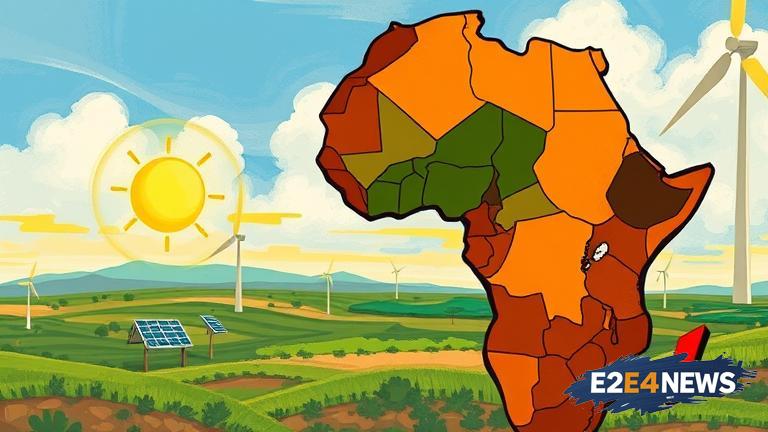Africa is undergoing a significant transformation in its energy landscape, with a growing focus on renewable energy sources such as solar, wind, and hydroelectric power. This shift is driven by the need to reduce dependence on fossil fuels, mitigate climate change, and provide energy access to the millions of Africans who currently lack it. The African Union’s Agenda 2063 has set ambitious targets for renewable energy adoption, aiming for at least 50% of the continent’s energy mix to come from renewable sources by 2030. Several African countries, including South Africa, Egypt, and Morocco, are already making significant strides in this direction. For instance, South Africa has launched a series of renewable energy auctions, which have attracted significant investment and led to the development of numerous solar and wind farms. Egypt, meanwhile, has set a target of generating 20% of its electricity from renewable sources by 2022, and has made significant progress in developing its solar and wind energy sectors. Morocco, which aims to generate 52% of its electricity from renewable sources by 2030, has become a leader in the field of concentrated solar power. Other African countries, such as Kenya and Tanzania, are also investing heavily in renewable energy, with a focus on geothermal and hydroelectric power. The benefits of renewable energy for Africa are numerous, including reduced greenhouse gas emissions, improved air quality, and enhanced energy security. Additionally, renewable energy can create jobs and stimulate local economies, particularly in rural areas where energy access is often limited. However, there are also challenges to be addressed, including the high upfront costs of renewable energy technologies and the need for significant investment in energy infrastructure. To overcome these challenges, African governments and international organizations are working together to develop innovative financing mechanisms and provide technical assistance to support the development of renewable energy projects. The private sector is also playing a crucial role, with companies such as Siemens and Vestas investing heavily in African renewable energy projects. Furthermore, the development of renewable energy in Africa is also being driven by the need to address the continent’s energy access gap, which is estimated to be around 600 million people. Renewable energy can provide a cost-effective and sustainable solution to this problem, particularly in rural areas where grid extension is often not feasible. In addition, renewable energy can also support the development of other sectors, such as agriculture and industry, by providing reliable and affordable energy. The use of renewable energy can also help to reduce the burden on Africa’s fragile healthcare systems, by reducing air pollution and improving public health. Moreover, the adoption of renewable energy can also help to promote economic development and reduce poverty, by creating jobs and stimulating local economies. The African Development Bank has estimated that the renewable energy sector could support the creation of up to 2 million jobs in Africa by 2025. Overall, the future of renewable energy in Africa looks bright, with the continent poised to become a global leader in the field. As the world transitions to a low-carbon economy, Africa is well-placed to take advantage of the opportunities presented by renewable energy, and to become a major player in the global energy market. The development of renewable energy in Africa will require continued investment, innovation, and cooperation, but the potential rewards are significant, and the benefits will be felt for generations to come. The African renewable energy market is expected to grow significantly in the coming years, driven by government policies and initiatives, as well as declining technology costs. The market is also expected to become increasingly competitive, with new players entering the market and existing players expanding their operations. In conclusion, Africa’s renewable energy revolution is gaining momentum, driven by a combination of government policies, private sector investment, and international cooperation. As the continent continues to transition to a low-carbon economy, it is likely that renewable energy will play an increasingly important role in Africa’s energy mix, and that the benefits of renewable energy will be felt across the continent.
Tue. Oct 21st, 2025
